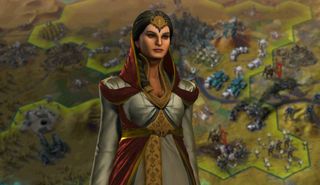
THE LOWS
Chris Thursten: Beyond Earth (but not very far)
Civilization: Beyond Earth hasn’t clicked with me yet. I’ve had access to the game for about a week, and in that time I’ve struggled to get to grips with whatever it is that makes this game more than Civ V in space. I know that our reviewer encountered the same feeling and ultimately moved past it, and I hope that the same is true in my case - but I was anticipating more surprises in the early game either way. So far, I’ve spent my time rooting out alien/barbarians while building relics/temples and building up my reserves of energy/gold. That’s not the new course for humanity that I was hoping to chart.
Andy Kelly: Time to upgrade
There comes a time in every PC gamer’s life when they realise that the graphics card that’s been dutifully chugging away in their PC for years has reached the end of its life. Alas, the GPU in my home PC, which I’ve shared thousands of hours of happiness with, is about to be yanked out and slung on the trash heap. Or in a drawer or something. The system requirements for games being announced these days are just getting ridiculous, and I can no longer ignore the fact that I’m going to have to splash out on some new hardware.

Phil Savage: Drag-on Ages
Last week, I was praising Dragon Age 2. This week, I have played more than five hours of it. I still love the way the characters interact, and the way their stories build and shift over the game's three acts. But fucking hell, that combat. More than the repetition of environments—that the same cave exists in, like, nine different places in the world—it's the constant grind of opponents that's wearing me down. Hey look, you turned a corner; have another smattering of random assassins, and then, when you've done that, have more that will literally materialise in front of you. It's a real downer in a game that I have otherwise enjoyed.
Andy Chalk: Paranautical Activity gets the boot from Steam
Pro-tip: If you're an indie developer who's worked long and hard on a game and finally managed to get your creation on Steam, do not threaten Gabe Newell with murder. I can't believe I even have to say that, but it actually happened this week: After Paranautical Activity hit a snag transitioning from Early Access to full release, Code Avarice co-founder Mike Maulbeck went on a Twitter tirade that culminated in a death threat aimed at Valve's top banana. The game, needless to say, was immediately removed from Steam.
Maulbeck was soon forced to resign from his company and give up all interest in and rights to the game, a heavy price to pay for a moment of anger and stupidity. But it's also a reminder that his actions affected more people than just himself; following Maulbeck’s resignation, his Code Avarice co-founder Travis Pfenning issued an official apology and is now working to get the game reinstated. There's no indication that will happen, and if it doesn't, its odds of finding an audience sufficient to keep the studio afloat are unpleasantly close to zero.

Tom Marks: Do you like it normal or smooth?
There has been a lot of good discussion lately about PC gamers expecting more from developers in terms of graphics settings. Clearly not everyone got the memo though. When I loaded up The Legend of Korra earlier this week, I was almost baffled to see how limited the settings were, consisting of a resolution option (which was capped at 1080p) and a single drop down menu labeled “Graphics” with only two choices: normal or smooth. I’m not even sure what those are supposed to mean.
PC Gamer Newsletter
Sign up to get the best content of the week, and great gaming deals, as picked by the editors.
Although this is only the second PC release for developer Platinum Games, they are by no means an inexperienced company and should absolutely be held to a higher standard than a resolution cap and a “smooth” option, especially when the game they’ve made is actually pretty fun to play. You can find my full review here.
Tyler Wilde: We need to stop saying ‘content’
The word ‘content’ describes the stuff inside an animal’s stomach. The stuff inside a game, or added to a game, however, is not a half-digested rat. The word has crept into the standard gaming nomenclature—we use it, gamers use it, publishers love to use it, promising hours and hours of ‘content’—and it drives me crazy. I bring it up today because, as I was browsing Steam this morning, it struck me what dumb term ‘downloadable content’ is, especially on Steam, where everything is downloadable. Not to mention the fact that it can’t be ‘content’ if it’s not already in the game. You can’t put the contents of something into that thing, as any adventure game inventory will tell you. God. It’s just awful.
OK, I know we're using a different definition, but it’s still the most generic way to describe anything. What happened to add-on or expansion or patch? I’d even rather use ‘stuff’ than ‘content,’ because at least it doesn’t have that bitter marketing flavor. But even better, how about we just say what that stuff is. I mean, what the hell are you saying when you tell me there’s hours of content? Do you just mean that there’s a bunch of dialogue? Or that I have to grind for two hours to get a downloadable sword? Tell me, and don’t diminish the hard work of the people who had to design and write and act out and program that adventure by calling it ‘content.’
Side note: ‘content’ is also not what we create on this website. We write articles and editorials and reviews and stories, damn it. The term has to go for all media.
With over two decades covering videogames, Tim has been there from the beginning. In his case, that meant playing Elite in 'co-op' on a BBC Micro (one player uses the movement keys, the other shoots) until his parents finally caved and bought an Amstrad CPC 6128. These days, when not steering the good ship PC Gamer, Tim spends his time complaining that all Priest mains in Hearthstone are degenerates and raiding in Destiny 2. He's almost certainly doing one of these right now.
Most Popular


